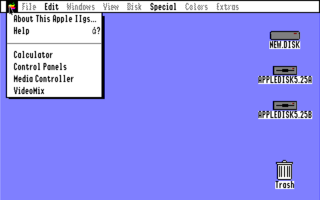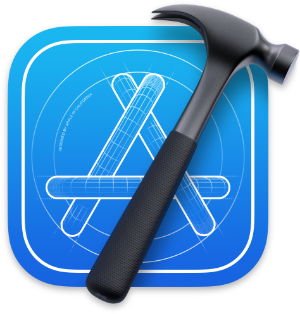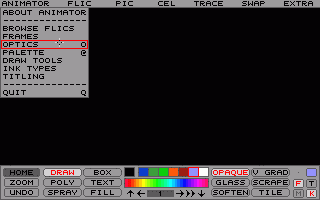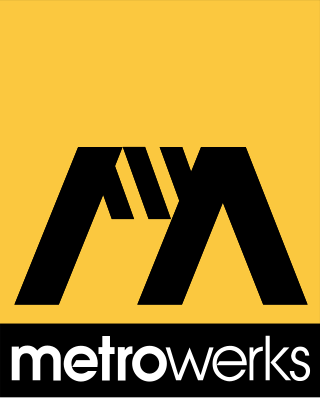
GS/OS is an operating system developed by Apple Computer for its Apple IIGS personal computer. It provides facilities for accessing the file system, controlling input/output devices, loading and running program files, and a system allowing programs to handle interrupts and signals. It uses ProDOS as its primary filing system. GS/OS is a component of Apple IIGS System Software versions 4.0 through 6.0.1, and was the first true 16-bit operating system for the IIGS.

The Oberon System is a modular, single-user, single-process, multitasking operating system written in the programming language Oberon. It was originally developed in the late 1980s at ETH Zurich. The Oberon System has an unconventional visual text user interface (TUI) instead of a conventional command-line interface (CLI) or graphical user interface (GUI). This TUI was very innovative in its time and influenced the design of the Acme text editor for the Plan 9 from Bell Labs operating system.

Xcode is Apple's integrated development environment (IDE) for macOS, used to develop software for macOS, iOS, iPadOS, watchOS, tvOS, and visionOS. It was initially released in late 2003; the latest stable release is version 15, released on September 18, 2023, and is available free of charge via the Mac App Store and the Apple Developer website. Registered developers can also download preview releases and prior versions of the suite through the Apple Developer website. Xcode includes command-line tools that enable UNIX-style development via the Terminal app in macOS. They can also be downloaded and installed without the GUI.

Autodesk Animator is a 2D computer animation and painting program published in 1989 for MS-DOS. It was considered groundbreaking when initially released.

The Colony is a first-person shooter developed by David Alan Smith. It was published by Mindscape.
Crobots is a programming game released for the first time by Tom Poindexter in December, 1985 as Shareware. It is an MS-DOS program for IBM PC and compatibles and was developed on x86-based Unix systems.

Metrowerks was a company that developed software development tools for various desktop, handheld, embedded, and gaming platforms. Its flagship product, CodeWarrior, comprised an IDE, compilers, linkers, debuggers, libraries, and related tools. In 1999 it was acquired by Motorola and in 2005 it was spun-off as part of Freescale, which continues to sell these tools. In 2015, Freescale Semiconductor was absorbed into NXP.
The Byte Works, founded and run by Mike Westerfield, was a key player in the history of developer tools for Apple II computers. Its first product, the ORCA/M assembler, developed jointly by Westerfield and Phil Montoya, was a powerful assembly language development environment, complete with a Unix-style shell, which ran on 8-bit Apple II computers.

AppleWin is an open source software emulator for running Apple II programs in Microsoft Windows. AppleWin was originally written by Mike O'Brien in 1994; O'Brien himself announced an early version of the emulator in April 1995 just before the release of Windows 95. Development of AppleWin passed to Oliver Schmidt and is now maintained by Tom Charlesworth. AppleWin originally required a minimum Intel 486 CPU and is written in C++.
The following tables list notable software packages that are nominal IDEs; standalone tools such as source-code editors and GUI builders are not included. These IDEs are listed in alphabetic order of the supported language.
Chez Scheme is a programming language, a dialect and implementation of the language Scheme which is a type of Lisp. It uses an incremental native-code compiler to produce native binary files for the x86, PowerPC, and SPARC processor architectures.

Ghidra is a free and open source reverse engineering tool developed by the National Security Agency (NSA) of the United States. The binaries were released at RSA Conference in March 2019; the sources were published one month later on GitHub. Ghidra is seen by many security researchers as a competitor to IDA Pro. The software is written in Java using the Swing framework for the GUI. The decompiler component is written in C++, and is therefore usable in a stand-alone form.
Tribal Trouble is a real-time strategy video game for PC. The game pits natives of tropical islands against invading Vikings. The game was originally developed by independent studio Oddlabs. The game was well received by the press and has won several awards.
Modula-2 is a structured, procedural programming language developed between 1977 and 1985/8 by Niklaus Wirth at ETH Zurich. It was created as the language for the operating system and application software of the Lilith personal workstation. It was later used for programming outside the context of the Lilith.
The Game Creators Ltd is a British software house based in Macclesfield, Cheshire, England, which specialises in software for video game development, originally for the Microsoft Windows platform. The company was established in March 1999 through a partnership between programmers Lee Bamber and Richard Vanner, who were joined by Meash Meakin in 2011 and Deborah Ascott-Jones in 2013.

Covid Watch was an open source nonprofit founded in February 2020 with the mission of building mobile technology to fight the COVID-19 pandemic while defending digital privacy. The Covid Watch founders became concerned about emerging, mass surveillance-enabling digital contact tracing technology and started the project to help preserve civil liberties during the pandemic.







